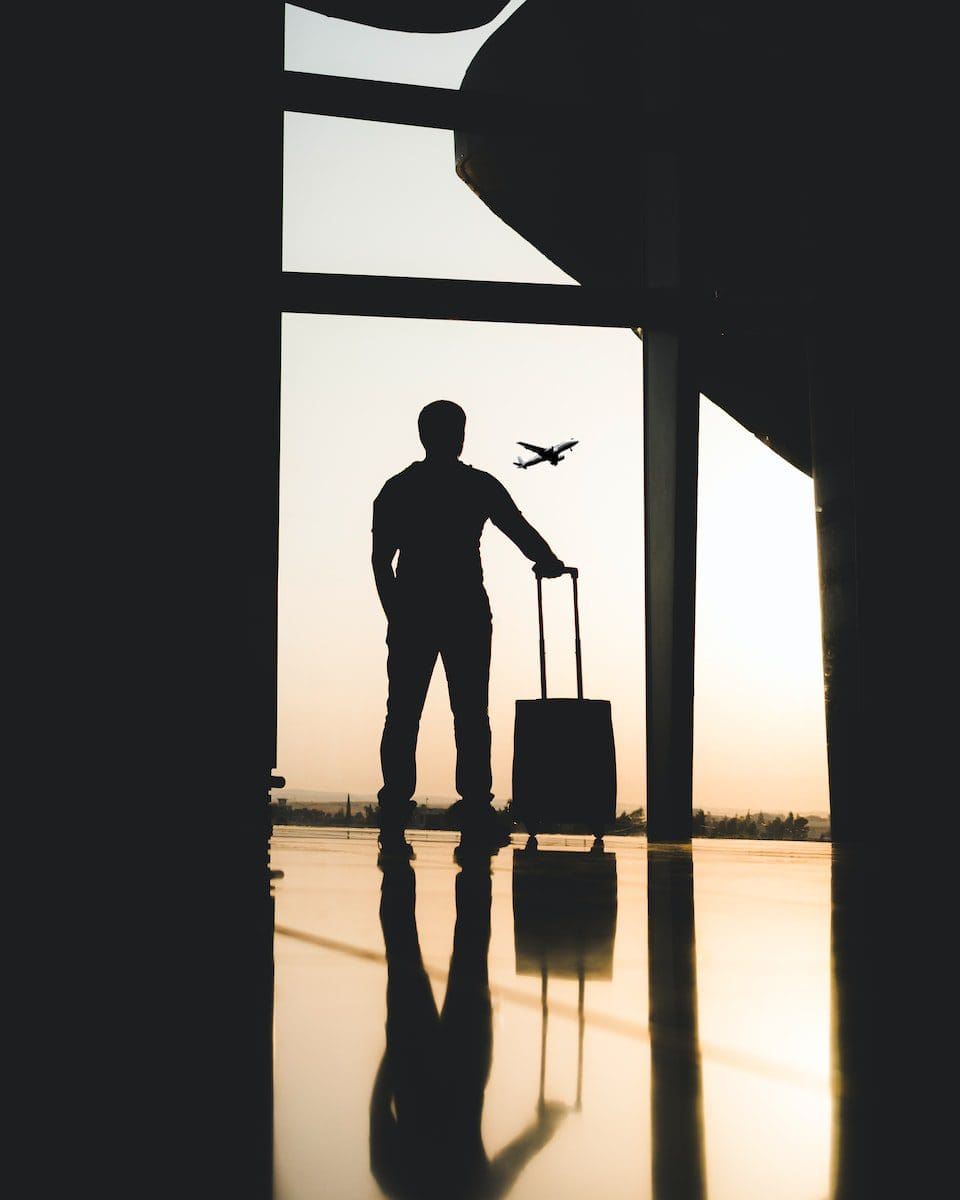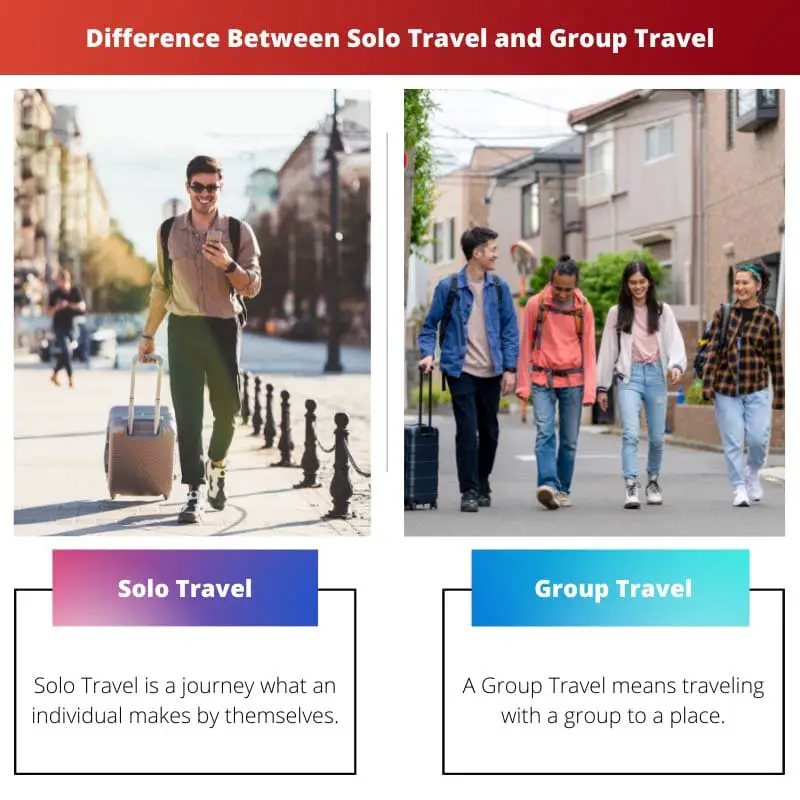“In Life, It’s Not Where You Go, and It’s Who You Travel With.”– quoted by Charles Schulz, it truly defines the meaning of a person’s tour. Travel is a big part of people’s lives. One makes them as an opportunity to vacation, do business or just an adventure trip.
Whether it be a Solo Travel or a Group one, a person has to make several decisions regarding their tour. Sure, they both are about making a journey. That’s where the similarities end. Both of these travels are quite different from each other otherwise.
Key Takeaways
- Solo travel involves travelling alone, while group travel involves travelling with a group of people.
- Solo travel allows for greater freedom and flexibility in itinerary planning, while group travel offers the opportunity to meet new people and share experiences.
- Solo travel can be more expensive due to the lack of cost-sharing, while group travel can be more affordable due to group discounts and shared expenses.
Solo Travel vs Group Travel
The difference between Solo Travel and Group Travel is that Solo Travel is about going through a journey alone. On the other hand, Group travel is all about taking a trip with a group of people. They can be your close ones, colleagues, or just other people who have booked the same trip as you.

Solo Travel is Travel that is made by an individual. All the planning the decisions regarding the Travel are made by that individual only. It makes this choice of Travel very flexible in comparison to other styles of Travel since all the arrangements are in the hands of the person.
Group Travel is a group of people making a trip for which people have already booked their arrangements. For people who have booked their trip with a planning company, the arrangements provided by them would be sharing a vehicle with other people, having a tour guide, and getting organized rooms and meals.
Comparison Table
| Parameters of Comparison | Solo Travel | Group Travel |
|---|---|---|
| Definition | Solo Travel is a journey what an individual makes by themselves. | A Group Travel means traveling with a group to a place. Usually, the group is led by an organizer. |
| Name of the person(s) | Individual traveler | Caravan |
| Advantages | Flexibility, privacy, etc. | Less planning than Solo Travel, Safer, etc. |
| Disadvantages | Planning is crucial, not time-efficient, etc. | Less freedom, hidden costs, etc. |
| Itinerary | No need for an itinerary. | There is an itinerary generally. |
What is Solo Travel?
Solo Travel is about going on a trip individually. It is all about what the person travelling wants to do during their allotted time during the Travel. They can decide all their decisions like where to stay, choose the places to visit according to their own schedule, and many other parts of the journey.
Solo travel is recommended for people who want to go on an adventure. They have the ability to work and plan on their own. They can explore more in comparison to Group Travel and see how the locals live and work in their place.
Planning is a very important step in Solo Travel. The person has to make all the choices themselves. The disadvantage can be that it takes time to get all the choices right. An individual makes this tour all by themselves.

What is Group Travel?
The quote “Let’s travel together and get lost in beautiful places.” perfectly makes a person feel how experience and exciting travelling as a group can be. Group travel is a journey in which a person makes a journey with a group. It can be their partner, parents, friends, or anyone really.
People can spend quality time with their close ones and their buddies or even make new friends group by going through a group. The group is headed by a planner that organizes the travel accommodation for the people, like the place of stay, meals, and the destination that the group would visit.
An itinerary is used for travellers that carry all the information about their stay. For example, where they would be staying, stoppage spots, places of a restaurant, etc. But one must be careful in choosing their planner since people have claimed that hidden costs are included in the trip.

Main Differences Between Solo Travel and Group Travel
- Solo Travel is about an individual travelling all alone on his/her own. On the contrary, Group Travel is about a group of people, either known or unknown, to a place.
- There is freedom of choice in travelling Solo Travel. In Group Travel, though, there is not much easy flexibility. This is because the decisions are not made according to a single person but in consideration of the whole group.
- Planning is harder in Solo Travel. All the decisions, from a choice to transport to visiting places, fall on the shoulders of an individual. On the other hand, in Group Travel, the decisions are comparatively easier since a guide is there or appointed. Thus, relaxing the people with planning duties.
- Group Travel is more time-efficient since another person already does all the planning or organizing for the transport and other functions of the travel, it is better for people on a time schedule. Sole Travel can be time-efficient, but mostly it is not since people make Solo Travel as a reason for adventure. It depends on the person on how they want to use their time.
- There is privacy in Solo Travel that one may not find in Group Travel. The reason is that Group Travel has a group of people going through places altogether. In Solo Travel, one can enjoy privacy to a greater length in comparison to Solo Travel.

- https://www.tandfonline.com/doi/abs/10.1080/10548408.2017.1363685
- https://ieeexplore.ieee.org/abstract/document/6521356/

Group travel, led by an organizer, involves an itinerary with detailed arrangements and predetermined stops, ensuring a more structured and guided experience.
Absolutely, the availability of a planned itinerary in group travel can be a deciding factor for travelers who seek a more structured travel experience.
Agreed. The organized itinerary in group travel offers a sense of security and convenience, particularly for those who prefer a planned journey.
Both solo and group travel present distinct advantages, making it important for travelers to evaluate their personal requirements and preferences to select the most suitable option.
Absolutely, being mindful of one’s own expectations and travel style is crucial in making an informed decision between solo and group travel experiences.
Indeed, individuals should consider factors such as freedom, social interaction, safety, and travel goals to determine the type of travel that aligns with their needs.
The comparison between solo and group travel highlights the importance of understanding individual travel preferences and the specific attributes of each type of travel experience.
Group travel offers the opportunity to meet new people, share experiences, and take advantage of group discounts and shared expenses.
Group travel also allows individuals to spend quality time with friends, family, or explore new destinations with people sharing similar interests.
Indeed, group travel can be more affordable due to the cost-sharing and discounts available, while also providing a sense of security and social interaction.
Group travel can be especially beneficial for those who prefer less planning and organization, as the trip is led by a designated organizer.
Yes, group travel offers convenience and safety, making it an appealing option for certain travelers who prefer a structured itinerary and shared arrangements.
Solo travel inherently involves more planning for various aspects of the trip, while group travel provides a level of organization and support through a designated planner.
Definitely. The differences in planning and coordination are key factors that influence the travel experience for both solo and group travelers.
That’s a valid point. Solo travelers may find satisfaction in planning and making all the decisions, whereas group travelers benefit from shared arrangements and professional organization.
Solo travel is recommended for those seeking adventure and the ability to explore destinations at their own pace while experiencing local culture more deeply.
Agreed. Solo travel provides an opportunity to immerse oneself in the local environment and understand the way of life in different places.
Solo travel enables people to have greater freedom and flexibility in choosing their itinerary. It ensures that all decisions during the trip are made by the individual.
Yes, that’s true. Solo travel allows for personalized planning and exploration according to one’s own schedule and preferences.
Both solo and group travel have their distinct advantages and disadvantages, catering to different preferences and travel styles.
Correct. Each type of travel has unique benefits and drawbacks, so it’s important to weigh the pros and cons based on personal preferences and travel goals.
Absolutely, it’s essential to consider individual travel preferences and priorities to choose the type of travel that best suits one’s needs.
Solo travel and group travel have their own pros and cons, depending on the level of autonomy, freedom, and social interaction that travelers seek during their journey.
Exactly. Understanding one’s travel preferences and priorities is essential in choosing between solo and group travel, as they offer unique experiences and opportunities.